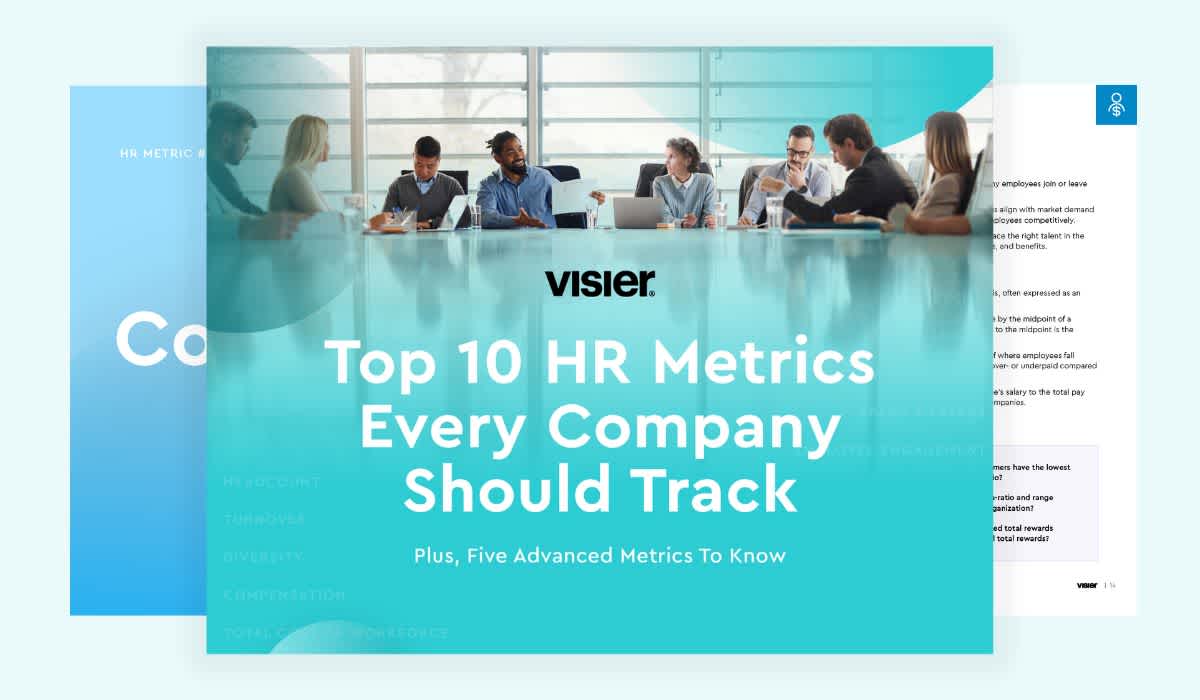Top 25 HR Leaders to Watch in 2023
The past year has seen many changes in business, HR, and the world. Meet the top 25 HR Leaders who will guide us in 2023.

A year ago, Visier predicted that 2022 would begin the age of the employee. Inflation is high, unemployment is low. Employees are in high demand, and employee demands are even higher. Many companies say that their people are their greatest asset, but they need skilled HR Leaders to create and maintain the best employee-employer relationship possible.
As new challenges crop up, HR leaders around the world navigate their organizations through tough times with vision and experience. Visier is proud to celebrate these standout HR leaders, all of whom prove that anything is possible when you put your people first. We asked them what it takes to be a good HR leader, where HR is going in the next five years, and their thoughts on HR’s role.
HR’s role in a company is positively evolving
Given the challenges of the past two years, HR is a hugely exciting area to work in. Now HR truly plays a more strategic role in shaping the organization’s future strategies and direction—gone are the days of compliance and transactional roles only. HR needs to grasp this and be positioned to act as change agents in implementing new people strategies that support future business strategies and create the blueprint for increased employee experience, engagement and success. The ability to positively impact and influence the day-to-day experience for my colleagues is a big motivation and driver for me.
Olly Britnell | Philip Morris International
Global Head of People Analytics
Skilled HR will continue to be a differentiator
HR continues to emerge as a critical contributor to the overall direction and success of organizations. Over the next five years markets will recognize that an organization’s ability to strategically manage its workforce is a key competitive differentiator, with the best HR functions helping drive the performance agenda. HR’s effectiveness in realizing strategic outcomes relies on its ability to advise, challenge and provide thought leadership at both an enterprise and employee level.
Rob Etheridge | HSBC
Global Head of Workforce Strategy and Insights
HR has evolved into a true leadership partner
The role of HR has evolved into being viewed as a true partner to organizational leaders and executives. This allows specialized functions like People Analytics a chance to shine as we build tools and enable access to right-sized and right-time data to meet business needs. The world of work has been changing so rapidly post-pandemic, I struggle to think of where we will be this time next year, let alone in the next five years. If I had to make a prediction, I’d say that HR professionals will become even more integral to business strategy as we advise and enable business leaders to make informed decisions to keep our companies competitive.
Sarah Everhart | Trane Technologies
Senior Analyst People Analytics
Talent is an endangered resource
Talent is an endangered resource and we need to discover new and creative ways to engage with anyone and everyone who is willing to work. In the next few years, organizations will need HR strategists more than ever. I see more transactional activities being automated and outsourced while the remaining HR team focuses on talent acquisition, retention, and development.
Catherine Garrett | Comerica Bank
SVP HR Operations, Technology and Risk
HR: “We’re business people first”

Lots of HR organizations are on the journey to become more data-driven, but not all. My fear is we’ll see polarization in terms of how analytically mature different HR organizations are. Some will double down and become even more advanced, but others will fall further behind. My advice: if you’re not already on the journey, there’s nothing to be gained by waiting to start. We need to make sure we are focused on achieving the crucial business metrics, not just HR metrics. HR professionals, however, can bring a crucially different lens to the conversation about how to do so, while being empathetic to our employees’ individual needs.
Matthew Hamilton
Vice President, People Analytics & HRIS
Diminishing availability of talent will shape industry
Diminishing availability of talent and the prioritization of work-life balance by the workforce will continue to be trends shaping our industry. Strategies to expand talent pools will be key. Personalizing the work experience to give employees more flexibility about where, when, how they work and leveraging technology to provide employees a more consumer type presence at work and find what they need 24/7 are examples I’m excited to see mature over the next 5 years.
Alison Hamm | Tampa General Hospital
Manager, People & Talent Operations
A Great HR Leader combines the best of business and people science
The workforce is increasingly considered an asset rather than a cost to be minimized. Organizations are more focused than ever on investing in and stewarding their people, recognizing the ways people drive organizational success. This creates a tremendous opportunity for HR to strategically drive success through evidence-based guidance on when, where and how people can be most effective. A great HR leader combines the best of business and people science.
David Hashemi | CommonSpirit Health
Director, People Insights
Why amplifying the voice of the workforce is an HR strength
Being a great HR leader takes empathy and intellectual curiosity. Quantifying the impact of people problems and people solutions is what makes leaders pay attention. HR, when done right, plays a critical strategic role to unlock the potential of each employee by keeping them engaged, happy, and productive. People Analytics is HRs secret weapon for its ability to partner with other HR functions—and the business—to know we are tracking the right metrics and using them to ensure all workforce decisions are data driven.
Jen Heckle | Wayfair
Head of Field People Analytics
Technology and analytics will transform and elevate HR
Technology and analytics are going to continue to transform and elevate the role of HR. Traditional transactional responsibilities will be more automated, enabling HR to operate more as a strategic advisory function. I’m particularly excited for the impact and innovation we’ll see in small and medium businesses, as cloud-based technologies will enable those companies to deliver great HR impact without big scale.
Scott Judd | eBay
Senior Director, People Analytics
How the role of HR will change
I think HR operating models will be shifting. As organizations digitize, mature, and respond to the ‘future of work’, the way in which we deliver employee experiences will need to pivot to accommodate. There will be a much stronger focus on crafting experiences and a shift away from process driven ways of working.
Melissa Kantor | The LEGO Group
Vice President, People Analytics and Insights & Head of Product, People, and Talent
Agility will be the key for HR in the next 5 years
The workplace has taken a major shift over the last two years that is here to stay. This means HR needs both agility in the way we work and agility for constant innovation. Whether we talk about the battle for talent, the evolution of benefits or the generational shifts in employees, it will be more important than ever to be proactive and evolve at a different pace. I have an appreciation and love for the challenges the HR team faces every day.
Craig Latham | KeyBank
Head of People Analytics and Benefits
Bringing humanity and empathy to work is increasingly important
As we move into a future of workers’ scarcity, HR has the opportunity to bring more humanity and empathy to the work environment, and to be the advocate for the workers amidst increased automation and algorithmic decision-making. HR is the champion for a great workplace experience. This requires an understanding of human-centered design principles, responsible use of analytics and AI to make informed workplace decisions. It also requires embracing the concept of work technology (versus HR technology) to improve the workers’ experience rather than just improving HR processes.
Stella Lupushor | Reframe.Work Inc
Chief-Reframer
Automation will take administrative work off HR’s plates
Continued improvements in automation and data will take a lot of the administrative work off people’s plates and (hopefully) enable HR and recruiting to be more strategic partners to the business. Removing a lot of the administrative work will also mean that HR teams can focus on the more human aspects of the work that can’t be automated, like coaching leaders.
Anna Merritt | Block (formerly Square)
Global Head of People Analytics
What it takes to be a great HR leader
Great HR leaders think multidimensionally. They understand that to create an environment where people want to work at their best, it takes a coordination of people, process, and policies that often go beyond the traditional “HR role”. HR is the keeper of the heart of the people. If done right it’s an epicenter of healthy culture and business impact. To be a great HR leader, I focus on helping create an inclusive future of work for everyone. When this happens a ripple effect is created well beyond the realm of HR and throughout organizations, communities, and societies.
Giselle Mota | ADP
Chief of Product Inclusion
HR has an opportunity to demonstrate value
I’m lucky to be working with some of the brightest scientists and engineers on the planet solving some of the hardest problems in biology, and I love the impact HR has on all our employees. HR teams are being put to the test right now helping their businesses navigate the global pandemic, a newly hybrid or remote workforce, a major disruption in the talent marketplace, a potential recession and for many: layoffs. For a data-driven HR function, these represent great opportunities to demonstrate how HR can deliver value to the business.
Erik Otteson | 10x Genomics
Head of People Ops & Analytics
HR uses data for the good of our colleagues
What I love most about being in HR is that we use data for the good of our colleagues, enabling strategic decisions that go beyond financials. I enjoy being a change agent enabled with the power of statistics. I expect to see significant advancements in how HR leverages technology to enable workforce planning, embracing flexible ways of working, with a focus on the impact a transparent employee value proposition can have on client outcomes.
Steven Piperno | FIS
Head of Global Workforce Analytics
HR advocate for business and the employees
Early in my career I debated whether to go into academia or the corporate world and I feel very grateful that I found my way to Human Resources. HR leaders serve a unique dual-purpose of being business executives who drive the goals of their company through the lens of the workforce, while also being advocates, caretakers, and the voice for employees. Doing what is fair, right, and in support of employees leads to stronger business results.
Richard Rosenow | Argo AI
Director of People Planning & Analytics
HR will drive meaningful culture change
Human resources will become more sophisticated as companies continue to battle in the war for talent to acquire and retain the best employees. HR will be on the forefront of driving meaningful culture change (DEIB) and promoting data-supported business decisions to ensure that companies have the talent needed in a world forever changed by the pandemic and increasing competition. Above all, HR must serve as a company’s heart and soul (i.e., compassion and guiding values) to ensure that employees come first.
Steve Rudolf | Baptist Healthcare System, Inc.
System Vice President, Human Resources
HR’s scope will expand
We will see disciplines that have traditionally resided within business/client focused areas make their way into HR and the HR offering for employees in the next five years. As the labor market continues to tighten, branding and recruitment marketing perspectives will become even more prevalent as employers look to position themselves as an employer of choice in the war for talent. A shiny external facing brand without a good internal employee experience is a recipe for unhappy new hires.
Mike Salva | Pitney Bowes
People Analytics & Reporting Manager
HR has a more important role in executive leadership
Instead of just cogs included in leadership discussions mostly just for performative numbers, HR is now seen as having valuable and even essential contributions. I hope we can keep that momentum going. Now that we have the microphone we need to capitalize on it and bring to light the additional value we can provide to the organization through things not traditionally thought of as HR such as data analysis. I am happiest when I can successfully demonstrate to a non-data person that data can be easy and valuable.
Corinna Schwartz | Becton Dickinson
Sr. Manager, People Analytics
HR scope will expand in the next five years
In the next five years I expect to see the scope of HR functions expand. Meaningful innovation in the HR tools and technology space enables HR functions to spend less time on manual work and make better and faster decisions. A decade ago using data to drive HR decisions was often touted as cutting edge—now it’s table stakes. Over the next five years I want to see HR go beyond excellent execution of the “standard” responsibilities (e.g. hiring, rewards, training) and take more ownership of shaping the entire employee experience—thinking holistically about how workers interact with technology, peers, places, and their outside of work challenges to identify and remove areas of unnecessary friction and figure out how to build culture and connection in increasingly virtual worlds.
Sarah Semmel | Stripe
People Analytics
What makes a great HR leader
As HR leaders, we must lead by example with authenticity to create a culture where everyone can succeed and excel. As HR leaders, we must do more to listen to what our employees are telling us and test interventions to meet the evolving needs of our people and our business. Within HR at Johnson & Johnson, our credo guides our responsibility to our employees at the core of our mission. Whether through increased focus on wellness, social justice, or changes in the way work gets done, HR professionals must be at the forefront to ensure we bring purpose to work while looking at an employee’s whole well-being to support performance and win today and in the future.
Doug Shagam | Johnson & Johnson
Head, People Data & Analytics
On the increasing role of HR in corporate leadership
Human Resources will take a larger role at the leadership table, particularly as organizations attempt to navigate the new workforce reality. Our ability to gather and interpret insights from inside and outside of our HR systems has allowed us to evolve from reporting to predicting, to see trends faster, and offer precise solutions. Human Resources is implementing the blueprint for the future of work.
Mark Smith | Providence
VP, Workforce Strategy & Analytics
Great HR leaders need many traits
Great HR leaders need compassion, problem solving, honesty, and the ability to separate fact from anecdotes. Humans are not robots, so a great HR leader has to connect everything together to make employees happy and successful. The challenge is going to be the dispersed nature of where people work now, being remote is here to stay and we must adjust.
Mark Tucker | Kong Inc
Director HR Technology & Analytics
Data driven insights will drive the future
The future will continue to be focused on data driven insights and solutions. Gone are the days of “thinking” you know the answer. You can now pinpoint the answer using data and design a solution that can really address the business need. For example, revealing drivers of attrition and targeting actions to identified areas to improve retention. As I think about the future, we will need to continue to develop more connections across sources of data to solve the most complex business challenges.
Katherine Ward, PhD | IQVIA
VP, Strategic Operations & People Analytics
Interested in learning more about Visier? Sign up for a demo today!


